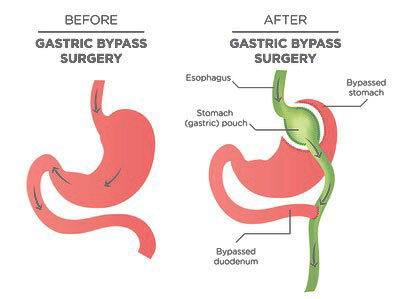Gastric Bypass Surgery
When and How to treat sleep apnea with gastric bypass?

Gastric bypass surgery should be considered in obstructive sleep apnea patients with a BMI greater than 30 kg/m2.
Weight loss improves symptoms of obstructive sleep apnea (OSA), and gastric bypass surgery has the potential to decrease sleep apnea severity.
If you are overweight, you should realize that obesity is a well known risk factor for sleep apnea, and many studies have shown a clear correlation between obstructive apnea and excess body weight.
Gastric weight loss surgery dramatically reduces the size of the stomach. With a smaller stomach, you are physically unable to eat large amounts of food. This type of surgery also shortness the small intestine, so your body absorbs less of the food eaten.
With less food entering in your body, fat stores begins to be used, and you will begin to loose weight.
This video will show you how bypass surgery is done:
While bypass surgery can decrease the severity of OSA, and a variety of studies have demonstrated the efficacy of this surgical technique in the treatment of obesity, it often does not eliminate OSA altogether.
If you are a man, and you are decided to treat your overweight with surgery, remember that men are more likely to have a higher risk of postoperative mortality.
Also...this type of surgery is usually reserved for patients whose body mass index is greater than 40, who have failed with changes in diet and life style.
A recent study suggests that depending on the surgical technique, an excess body weight loss of 40-50% can be achieved.
Nevertheless, weight loss, if maintained long term, will likely be the best means for reducing severity of OSA and remains a large public health challenge.
Home › Sleep Apnea Treatment › Gastric Bypass Surgery







